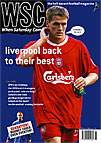 The birthplace of Napoleon is enjoying a football revival. Dan Brierley reports on how Ajaccio and Bastia are getting on in the French first division
The birthplace of Napoleon is enjoying a football revival. Dan Brierley reports on how Ajaccio and Bastia are getting on in the French first division
Football isn’t the first thing you associate with the island of Corsica, but this season, for the first time since 1972-73, SC Bastia were joined by AC Ajaccio in the French first division. Fifty-two thousand people took to the streets to celebrate.
It was one of the best days on the island since February 27, 1967, regarded as the greatest moment in Corsican football history. The French government had organised a series of matches between France and the regions, including La Corse. The match was played in Marseille where a full house was guaranteed. Corsica won 2-0 and, as far as their fans were concerned, struck a blow for their right to self-government.
Corsica’s status as part of metropolitan France is an issue that has raged for almost half a century, leading to abortive attempts at home rule, terrorist attacks and the bizarre appointment of a direct descendant of Nap oleon, Corsica’s most famous son, as governor. Even now, when Bastia travel to the Parc des Princes to play PSG, they are met with chants of “Terroristes, Terroristes”. Corsica’s symbol is the testa di moru, a Moor’s head. Both Bastia and Ajaccio have this stark image of a bandit on their crests.
Bastia have coped with more adversity than most. The city, in the shadow of its glamorous neighbour Ajaccio to the south, is a semi-industrial port which likes to see itself as down-to-earth and less flashy than the southerners. This inferiority complex still exists despite Bastia being the more successful club by far. UEFA Cup finalists back in 1978 and French cup winners three years later, they reached the cup final again last season, only to lose 1-0 to relegated Lorient, thanks to a goal from ex-Nottingham Forest striker Jean-Claude Darcheville.
Bastia’s cup defeat marked the tenth anniversary of the tragedy at their Furiani stadium. In a French cup semi-final against Marseille on May 5, 1992, a temporary stand collapsed minutes before kick-off, killing 18 people and seriously injuring hundreds more. Olympique de Marseille have also played an important part in ACA’s history. It was Roland Courbis, a former OM manager, who steered Ajaccio to promotion from the second division before he was sent packing in July by the French FA for alleged fraud in his transfer dealings – as manager of OM. He made a Cantona-esque comment on his suspension – “It is like a baker being banned from making bread because he has been caught speeding” – and was allowed to resume his place in the dugout in January.
More shameful to ACA would have been to play their home games in Bastia. In May the French FA decided that the Stade François Coty was not fit for the top division. A ground-sharing option was avoided at the 11th hour by some persistent lobbying by the club chairman.
At the end of January, Ajaccio faced Bastia at home. Bastia had hit form and taken ten points in their previous four games, moving them away from the drop zone; Ajaccio hovered one place above relegation and had to win. Bastia had ex-Sunderland forward Lilian Laslandes leading their attack; Ajaccio were boosted by the shock signing of ex-Juventus striker Juan Esnaider on a pay-as-you-play scheme. Gérard Houllier had also done his bit for Corsican football, loaning Gregory Vignal out to Bastia and Bernard Diomède to Ajaccio.
Bruno Rodriguez opened the scoring for the hosts, but Bastia levelled in the second half through Franck Silvestre. It finished 1-1 and the draw suited Bastia more than Ajaccio, as the latter were now only out of the relegation zone on goal difference.
If Corsican football is to progress, then both teams must stay in the top division, and both must work on their infrastructure at the grass-roots level. The make-up of the two teams is almost entirely French – Ajaccio, for example, have just two Corsicans in their squad, Rodriguez and reserve keeper Hervé Selki.
Ticket sales may well be improved as a result of signings like Diomède or Laslandes, but the Corsican fans’ desire to see their compatriots wearing the maillot of Ajaccio or Bastia cannot be underestimated. They need a Corsican Zidane to come through. And you don’t get that by buying Sunderland rejects.
From WSC 193 March 2003. What was happening this month